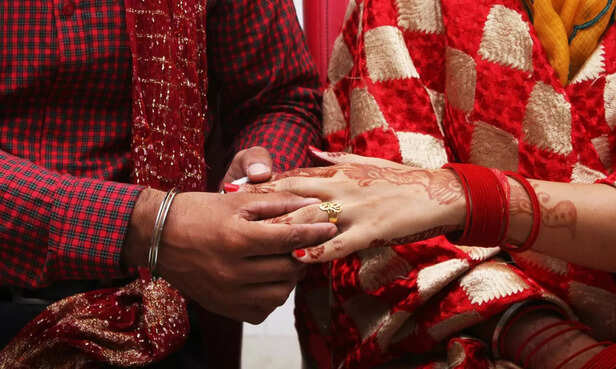She Paid to Marry You. Now She’s Paid to Leave You. It’s Alimony — Not a Privilege.
Nidhi | Oct 29, 2025, 12:39 IST
Marriage
( Image credit : Times Life Bureau )
For generations, women were expected to bring wealth into marriage - gold, dowry, and devotion; while men offered “security.” But when the same system now asks men to pay alimony, the outrage reveals more about ego than fairness. This article explores how alimony isn’t a privilege but payback for centuries of unpaid emotional and domestic labour. It’s not about money — it’s about accountability, equality, and the long-overdue recognition of women’s invisible contributions inside homes and marriages.
For centuries, marriage has been a social contract written in invisible ink - one where women signed away autonomy in exchange for acceptance. The world called it love, but often, it was labour. From unpaid domestic work to emotional caregiving, women became the invisible engines of stability, performing roles that kept families, economies, and egos intact.
Patriarchy, for all its romantic disguises, was never about protection. It was about possession. Men were taught to provide not because they were more capable, but because control was the reward for that “responsibility.” Women were made to depend not because they were weaker, but because dependence made them easier to own.
Now, when a woman seeks alimony, that centuries-old equation finally begins to balance — and that’s what disturbs men most.
 For centuries, men called it tradition when women brought dowry, gold, or family honour into marriage - but call it exploitation when asked to pay alimony. The hypocrisy isn’t new; it’s just louder now.
For centuries, men called it tradition when women brought dowry, gold, or family honour into marriage - but call it exploitation when asked to pay alimony. The hypocrisy isn’t new; it’s just louder now.
Marriage, after all, was never free: it was an exchange masked as emotion. She paid to belong; he paid nothing to own.
Now, when alimony forces that equation to balance, men call it unfair. But what it really does is expose the fine print patriarchy never wanted to read - that unpaid labour, emotional endurance, and years of sacrifice were never free.
According to Oxfam, women perform unpaid care work worth ₹19 lakh crore annually; nearly 7% of India’s GDP. Alimony doesn’t undo that debt. It merely sends the invoice.
Because if dowry was the price of marrying her, alimony is the cost of underestimating her.
 Alimony doesn’t just hit a man’s wallet - it hits the myth he was taught to live by.
Alimony doesn’t just hit a man’s wallet - it hits the myth he was taught to live by.
For generations, manhood has been defined by control — control over money, decisions, and the people around him. Society told men that being the “provider” was their purpose, that power was proof of masculinity.
So when the law asks a man to share what he earns, it’s not just his income being questioned — it’s his identity. An alimony order doesn’t wound his finances as much as it bruises his ego. That’s why the outrage over alimony isn’t really about money. It’s about power — and the fear of finally losing it.
 Men often argue that “modern women can earn, so why do they need alimony?”
Men often argue that “modern women can earn, so why do they need alimony?”
The answer lies in structural inequality, not sentiment.
Women’s workforce participation in India stands at just 37%, compared to men’s 79% (ILO, 2023). Even among those employed, women earn 20-30% less on average for the same work. Add to that the career breaks taken for childbirth, relocation, and domestic care — and the financial disparity becomes generational.
Alimony exists because women were historically excluded from the very opportunities men now use to claim moral high ground.
It’s not a privilege — it’s a structural equalizer.
But here’s the irony: the same society that normalizes dowry as a marital cost finds alimony offensive as a moral one. When a woman’s family pays to give her away, it’s culture; when she’s compensated for years of unpaid service, it’s greed.
Patriarchy has always been comfortable with women paying — just not with women being paid.
 The outrage around alimony often stems from a moral confusion: men think fairness should never cost them anything. But fairness always costs the privileged first.
The outrage around alimony often stems from a moral confusion: men think fairness should never cost them anything. But fairness always costs the privileged first.
For centuries, women’s sacrifices were normalized as duty - raising children, managing homes, relocating careers, enduring emotional neglect — all under the halo of “love.” Alimony only assigns value to what society conveniently left unpriced.
When a court awards alimony, it doesn’t declare women victims — it declares their contribution visible. It says that care has economic value and that partnership isn’t one-sided. That realization hurts not because it’s unfair, but because it’s true.
“Equality doesn’t feel like justice to those who were never asked to share.”
 Alimony is often mocked as transactional, but so was marriage — patriarchy just romanticized it better.
Alimony is often mocked as transactional, but so was marriage — patriarchy just romanticized it better.
The real conversation here isn’t about a cheque; it’s about closure. It’s about a woman finally being recognized not for leaving, but for everything she gave before she did. It’s about dignity, not dependency.
Men often mistake her demand for compensation as revenge. In truth, it’s reckoning.
Because when you strip away the emotions, alimony is society saying one simple thing: your labour was real, your time was valuable, and your silence had cost.
Call it alimony if you want — but really, it’s just patriarchy paying its dues.
Patriarchy, for all its romantic disguises, was never about protection. It was about possession. Men were taught to provide not because they were more capable, but because control was the reward for that “responsibility.” Women were made to depend not because they were weaker, but because dependence made them easier to own.
Now, when a woman seeks alimony, that centuries-old equation finally begins to balance — and that’s what disturbs men most.
1. Patriarchy Turned Marriage Into a Transaction. Alimony Only Calls It What It Is.

Indian marriage
( Image credit : Pexels )
Marriage, after all, was never free: it was an exchange masked as emotion. She paid to belong; he paid nothing to own.
Now, when alimony forces that equation to balance, men call it unfair. But what it really does is expose the fine print patriarchy never wanted to read - that unpaid labour, emotional endurance, and years of sacrifice were never free.
According to Oxfam, women perform unpaid care work worth ₹19 lakh crore annually; nearly 7% of India’s GDP. Alimony doesn’t undo that debt. It merely sends the invoice.
Because if dowry was the price of marrying her, alimony is the cost of underestimating her.
2. Why Men Take Alimony Personally: The Identity Crisis

Marriage Laws
( Image credit : Freepik )
For generations, manhood has been defined by control — control over money, decisions, and the people around him. Society told men that being the “provider” was their purpose, that power was proof of masculinity.
So when the law asks a man to share what he earns, it’s not just his income being questioned — it’s his identity. An alimony order doesn’t wound his finances as much as it bruises his ego. That’s why the outrage over alimony isn’t really about money. It’s about power — and the fear of finally losing it.
3. The Privilege Paradox: When Fairness Feels Like Oppression

Marriage Rituals
( Image credit : Freepik )
The answer lies in structural inequality, not sentiment.
Women’s workforce participation in India stands at just 37%, compared to men’s 79% (ILO, 2023). Even among those employed, women earn 20-30% less on average for the same work. Add to that the career breaks taken for childbirth, relocation, and domestic care — and the financial disparity becomes generational.
Alimony exists because women were historically excluded from the very opportunities men now use to claim moral high ground.
It’s not a privilege — it’s a structural equalizer.
But here’s the irony: the same society that normalizes dowry as a marital cost finds alimony offensive as a moral one. When a woman’s family pays to give her away, it’s culture; when she’s compensated for years of unpaid service, it’s greed.
Patriarchy has always been comfortable with women paying — just not with women being paid.
4. Why Alimony Feels Unfair — When It’s the First Time Fairness Hurts

Alimony
( Image credit : Pexels )
For centuries, women’s sacrifices were normalized as duty - raising children, managing homes, relocating careers, enduring emotional neglect — all under the halo of “love.” Alimony only assigns value to what society conveniently left unpriced.
When a court awards alimony, it doesn’t declare women victims — it declares their contribution visible. It says that care has economic value and that partnership isn’t one-sided. That realization hurts not because it’s unfair, but because it’s true.
“Equality doesn’t feel like justice to those who were never asked to share.”
5. The Real Conversation: It Was Never About Money

Alimony
( Image credit : Freepik )
The real conversation here isn’t about a cheque; it’s about closure. It’s about a woman finally being recognized not for leaving, but for everything she gave before she did. It’s about dignity, not dependency.
Men often mistake her demand for compensation as revenge. In truth, it’s reckoning.
Because when you strip away the emotions, alimony is society saying one simple thing: your labour was real, your time was valuable, and your silence had cost.
Call it alimony if you want — but really, it’s just patriarchy paying its dues.
